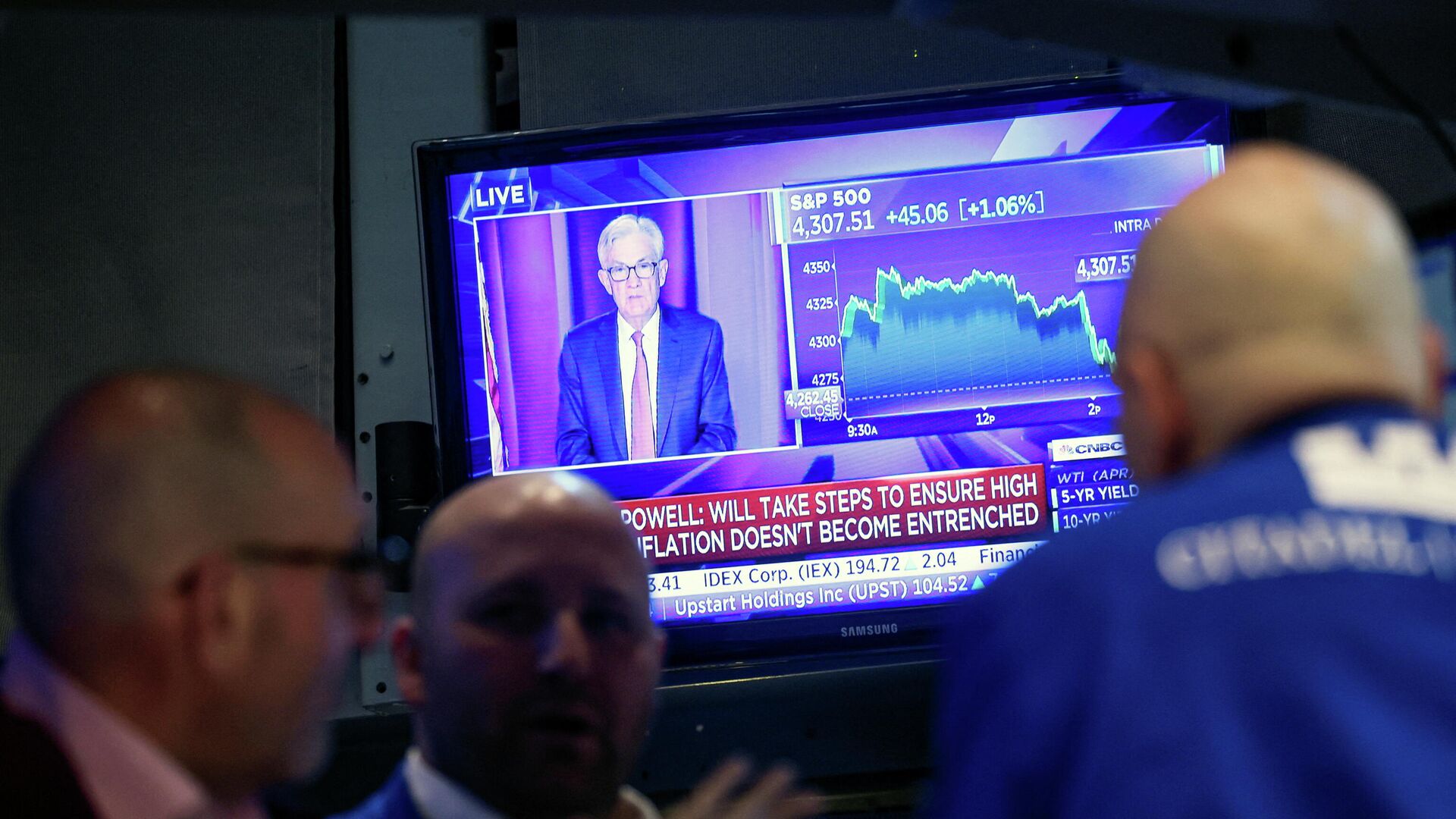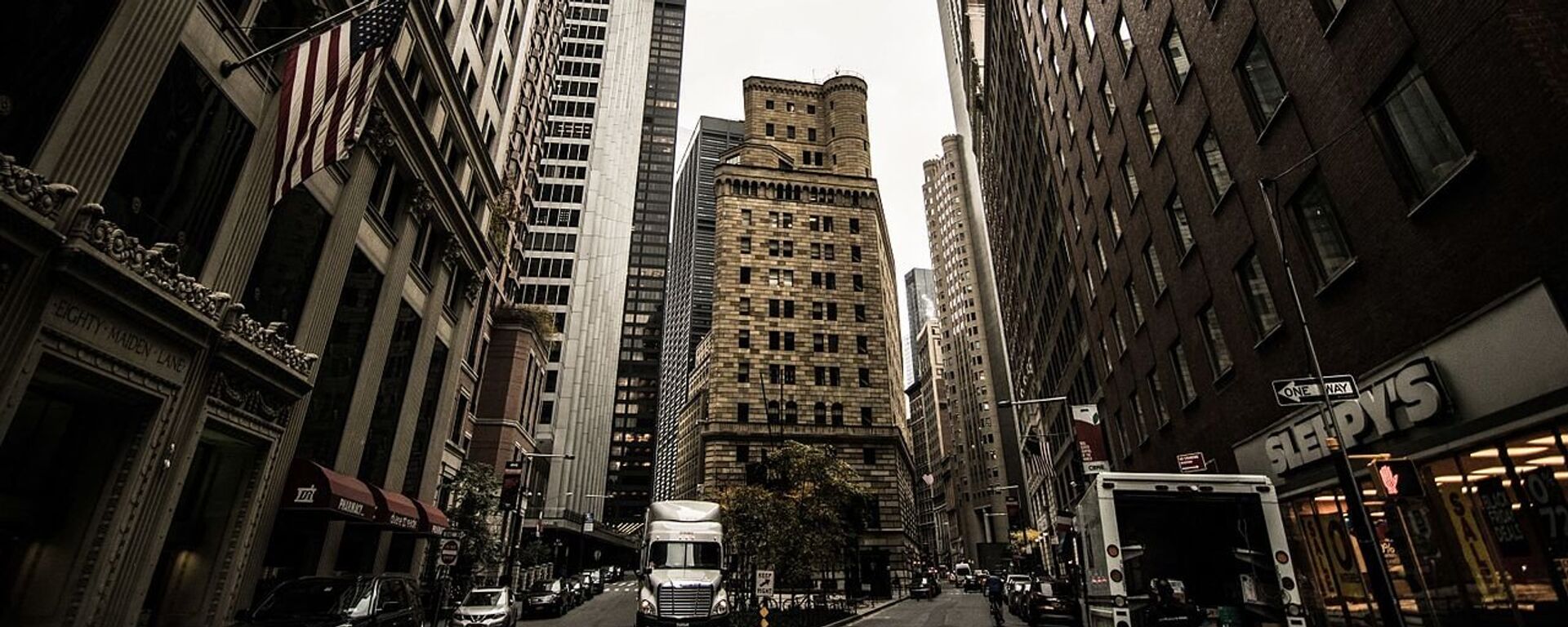https://sputnikglobe.com/20220318/big-tech-stocks-up-most-since-april-2020-after-federal-reserve-undertakes-modest-rate-hike-1093996143.html
Big Tech Stocks Up Most Since April 2020 After Federal Reserve Undertakes Modest Rate Hike
Big Tech Stocks Up Most Since April 2020 After Federal Reserve Undertakes Modest Rate Hike
Sputnik International
NEW YORK (Sputnik) - A modest US interest rate hike helped Wall Street post its most powerful weekly rally since the recovery from the coronavirus pandemic... 18.03.2022, Sputnik International
2022-03-18T21:18+0000
2022-03-18T21:18+0000
2022-03-18T21:18+0000
us federal reserve
us
us stocks
interest rate
business
inflation
https://cdn1.img.sputnikglobe.com/img/07e6/03/12/1093996117_0:0:3073:1728_1920x0_80_0_0_3d1a7d2d4ea503fdf6f4a7cecfdc0b9a.jpg
Wall Street’s three major stock indexes - the Dow Jones Industrial Average index, the S&P 500 and the Nasdaq Composite - closed Friday’s trade up between 0.8% and 2.1%. For the week, the indexes were up between 6% and more than 8%.The Nasdaq, made up of highly-valued tech stocks such as Facebook, Amazon, Apple, Nasdaq and Google, which are grouped under the FAANG acronym, led gains on both accounts.The US central bank's policy-making Federal Open Market Committee (FOMC) approved a 25-basis point interest rate increase at its March 15-16 meeting, its first increase since the outbreak of the COVID-19 crisis in March of 2020. It also cautioned that there could be as many as six more rate hikes this year, based on the number of calendar FOMC meetings.Federal Reserve Chairman Jerome Powell, however, reiterated after this week’s rate increase that the central bank will be "nimble" as it tries to balance the fastest economic growth in nearly four decades with inflation, also growing at its most frenetic pace in 40 years. US gross domestic product was up 5.7% last year after a 3.5% contraction in 2020, growing at its most since 1984. Inflation, measured by the Consumer Price Index, or CPI, expanded by 5.8% in 2021, its most since 1982.Analysts said investors were assured by the central bank's determination to tackle inflation with a combination of aggressive and sensible rate hikes.Federal Reserve Governor Christopher Waller - one of the more hawkish members of the FOMC - said US economic data is "screaming" for bigger half percentage point rate hikes in coming months to stamp out inflation. Waller said he might push for a series of 50-basis point increases at coming FOMC meetings to "front load" a tighter policy that would have a greater impact in tamping down inflation.The Nasdaq Composite, made of highly-valued tech stocks such as Facebook, Amazon, Apple, Nasdaq and Google, finished up 2.1% on the day and 8.2% on the week for its biggest weekly percentage gain since April 2020. For the year though, Nasdaq remains down 11.2%.The S&P 500, which groups the top 500 US stocks, settled up 1.2% on the day and 6.2% on the week. For the year, it was down 6.4%.The Dow Jones Industrial Average, made up mostly of industrial stocks, closed the day up 0.8% and 5.5% on the week. The Dow was down about 4.4% on the year.
https://sputnikglobe.com/20220318/us-federal-reserve-risk-losing-credibility-against-inflation-without-bigger-rate-hike-members-say-1093994323.html
Sputnik International
feedback@sputniknews.com
+74956456601
MIA „Rosiya Segodnya“
2022
Sputnik International
feedback@sputniknews.com
+74956456601
MIA „Rosiya Segodnya“
News
en_EN
Sputnik International
feedback@sputniknews.com
+74956456601
MIA „Rosiya Segodnya“
Sputnik International
feedback@sputniknews.com
+74956456601
MIA „Rosiya Segodnya“
us federal reserve, us, us stocks, interest rate, business, inflation
us federal reserve, us, us stocks, interest rate, business, inflation
Big Tech Stocks Up Most Since April 2020 After Federal Reserve Undertakes Modest Rate Hike
NEW YORK (Sputnik) - A modest US interest rate hike helped Wall Street post its most powerful weekly rally since the recovery from the coronavirus pandemic, with the Big Tech sector rising more than 8% as investors signaled confidence in the Federal Reserve’s bid to tame the worst inflation pressure in 40 years.
Wall Street’s three major stock indexes - the Dow Jones Industrial Average index, the S&P 500 and the Nasdaq Composite - closed Friday’s trade up between 0.8% and 2.1%. For the week, the indexes were up between 6% and more than 8%.
The Nasdaq, made up of highly-valued tech stocks such as Facebook, Amazon, Apple, Nasdaq and Google, which are grouped under the FAANG acronym, led gains on both accounts.
"FAANG stalwarts have been oversold for too long and investors are gravitating to quality cloud and security stocks," Ed Moya, analyst at online trading platform OANDA, said.
The US central bank's policy-making Federal Open Market Committee (FOMC)
approved a 25-basis point interest rate increase at its March 15-16 meeting, its first increase since the outbreak of the COVID-19 crisis in March of 2020. It also cautioned that there could be as many as six more rate hikes this year, based on the number of calendar FOMC meetings.
Federal Reserve Chairman Jerome Powell, however, reiterated after this week’s rate increase that the central bank will be "nimble" as it tries to balance the fastest economic growth in nearly four decades with inflation, also growing at its most frenetic pace in 40 years. US gross domestic product was up 5.7% last year after a 3.5% contraction in 2020, growing at its most since 1984. Inflation, measured by the Consumer Price Index, or CPI, expanded by 5.8% in 2021, its most since 1982.
Analysts said investors were assured by the central bank's determination to tackle inflation with a combination of aggressive and sensible rate hikes.
"Wall Street is expecting a Fed that will front load their rate hikes and that should keep the flattener trade firmly in place," said OANDA’s Moya.
Federal Reserve Governor Christopher Waller - one of the more hawkish members of the FOMC - said US economic data is "screaming" for bigger half percentage point rate hikes in coming months to stamp out inflation. Waller said he might push for a series of 50-basis point increases at coming FOMC meetings to "front load" a tighter policy that would have a greater impact in tamping down inflation.
The Nasdaq Composite, made of highly-valued tech stocks such as Facebook, Amazon, Apple, Nasdaq and Google, finished up 2.1% on the day and 8.2% on the week for its biggest weekly percentage gain since April 2020. For the year though, Nasdaq remains down 11.2%.
The S&P 500, which groups the top 500 US stocks, settled up 1.2% on the day and 6.2% on the week. For the year, it was down 6.4%.
The Dow Jones Industrial Average, made up mostly of industrial stocks, closed the day up 0.8% and 5.5% on the week. The Dow was down about 4.4% on the year.




